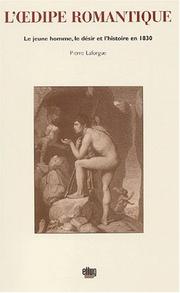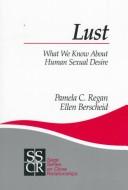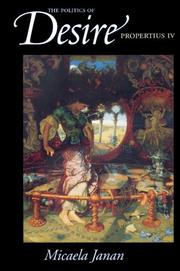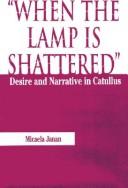| Listing 1 - 10 of 10 |
Sort by
|
Book
ISBN: 9780773539716 0773539719 1283583941 9780773586949 0773586946 9781283583947 Year: 2012 Publisher: Montréal [Que.] McGill-Queen's University Press
Abstract | Keywords | Export | Availability | Bookmark
 Loading...
Loading...Choose an application
- Reference Manager
- EndNote
- RefWorks (Direct export to RefWorks)
The tragic love of Francesca da Rimini and Paolo Malatesta - a classic story of passion and death - revisited through the lenses of literature, philosophy and theology.
Desire in literature. --- Lust in literature. --- Love in literature. --- Civilization, Medieval. --- Désir dans la littérature --- Luxure dans la littérature --- Amour dans la littérature --- Civilisation médiévale --- Dante Alighieri, --- Désir dans la littérature --- Luxure dans la littérature --- Amour dans la littérature --- Civilisation médiévale --- Civilization, Medieval --- Medieval civilization --- Middle Ages --- History --- Civilization --- Chivalry --- Renaissance
Book
ISBN: 1630874515 9781630874513 Year: 2014 Publisher: Eugene, Oregon
Abstract | Keywords | Export | Availability | Bookmark
 Loading...
Loading...Choose an application
- Reference Manager
- EndNote
- RefWorks (Direct export to RefWorks)
In this book Paul O. Ingram adds his voice to a long list of writers seeking to relate Christian tradition to the hard realities of this post-Christian age of religious and secular pluralism. As a Lutheran, Ingram thinks grace flows over this universe like a waterfall. So he brings Christian mystical theology into a discussion of the meaning of grace.Alfred North Whitehead's philosophical vision provides a language that serves as a hermeneutical bridge by which historians of religions can interpret the teachings and practices of religious Ways other than their own without falsification, and by
Mysticism. --- Spiritual life --- Dark night of the soul --- Mystical theology --- Theology, Mystical --- Negative theology --- Christianity. --- Porete, Marguerite, --- Miroir des simples âmes (Porete, Marguerite) --- Miroir des âmes simples et anéanties et qui seulement demeurent en vouloir et désir d'amour (Porete, Marguerite) --- Mirouer des simples âmes (Porete, Marguerite)

ISBN: 2843100402 2377471293 Year: 2002 Volume: *2 Publisher: Grenoble Ellug
Abstract | Keywords | Export | Availability | Bookmark
 Loading...
Loading...Choose an application
- Reference Manager
- EndNote
- RefWorks (Direct export to RefWorks)
L'œdipe est peut-être moins une structure de la psychè humaine qu'une configuration philosophique qui s'inscrit dans l'histoire. Aussi n'est-ce pas le complexe d'Œdipe des héros romantiques qui est envisagé dans ce livre, ni non plus le mythe d'Œdipe au temps du romantisme, mais l'œdipe tel qu'il s'élabore dans les années 1830, au moment où l'imaginaire et le symbolique sont en train de se recomposer. Il s'agit d'interroger l'œdipe dans la relation qu'il entretient à la société et à l'histoire et de voir comment cette chimère travaille les textes de cette époque. L'approche, qui croise constamment le fantasmatique et l'idéologique, est sociocritique. L'ensemble s'organise en deux parties. La première, synchronique, constitue une anthropologie du romantisme de 1830 et essaie de montrer que dans la référence à Œdipe se formulent à cette époque des questions historiques autant que sociales et politiques. La seconde partie est composée de huit monographies, consacrées à quelques textes essentiels du romantisme où se voit à l'œuvre une écriture de l'œdipe : Le Rouge et le Noir, Lucrèce Borgia, Lorenzaccio, Fantasio, Volupté, Le Père oriot, La Confession d'un enfant du siècle, Le Lys dans la vallée.
Thematology --- French literature --- anno 1800-1899 --- Oedipus complex in literature. --- Desire in literature. --- Romanticism --- Littérature française --- Complexe d'Oedipe dans la littérature --- Désir dans la littérature --- Romantisme --- Themes, motives. --- Thèmes, motifs --- Littérature française --- Complexe d'Oedipe dans la littérature --- Désir dans la littérature --- Thèmes, motifs --- Desire in literature --- Oedipus complex in literature --- History and criticism --- History and criticism. --- imaginaire --- psychè --- psychologie --- romantisme

ISBN: 0195137671 0195350227 1280473762 1433700573 0197704859 Year: 2001 Publisher: Oxford Oxford university press
Abstract | Keywords | Export | Availability | Bookmark
 Loading...
Loading...Choose an application
- Reference Manager
- EndNote
- RefWorks (Direct export to RefWorks)
The Greek poet Simonides produced elegies, threnodies, choral odes and a small epic. In 1992 a new fragment of the oxyranchus papyri was discovered to contain a substantial amount of his work, which has revolutionised scholars' views.
Desire in literature --- Manuscripts, Greek (Papyri) --- Praise in literature --- Greek papyri --- Papyri, Greek --- Manuscripts, Classical (Papyri) --- Manuscripts (Papyri) --- Simonides, --- Simonide, --- Criticism and interpretation. --- Manuscripts. --- Desire in literature. --- Manuscripts, Greek (Papyri). --- Praise in literature. --- Elegiac poetry, Greek --- Epic poetry, Greek --- Poésie élégiaque grecque --- Poésie épique grecque --- Papyrus grecs --- Eloges dans la littérature --- Désir dans la littérature --- History and criticism --- Histoire et critique --- Simonides Ceus --- Simonides van Keos --- Simonides --- Simonides lyricus --- Simonide de Céos

ISBN: 0761917934 0761917926 1452233721 145226368X 1322418322 9781452263687 9781452233727 9780761917922 9780761917939 9781322418322 Year: 1999 Volume: *1 Publisher: Beverly Hills Sage
Abstract | Keywords | Export | Availability | Bookmark
 Loading...
Loading...Choose an application
- Reference Manager
- EndNote
- RefWorks (Direct export to RefWorks)
Covering the theory and research on the characteristics of sexual desire, the authors use findings from research on sexual and romantic attraction. The book also explores the individual physical and mental factors that influence sexual desire.
Begeerte --- Carnal desire --- Concupiscence --- Desire --- Drift [Seksuele ] --- Débauche --- Désir --- Désir charnel --- Désir sexuel --- Gender (Sex) --- Lasciviousness --- Lascivité --- Lechery --- Licentiousness --- Lubricité --- Lust --- Luxure --- Seksualiteit --- Seksuele drift --- Sex --- Sex (Gender) --- Sexual lust --- Sexualiteit --- Sexualité --- Vleselijke lust --- Wellust --- Zinnelijke lust --- #gsdbP --- 392.6 --- #PBIB:1999.4 --- Sexual excitement --- Appetency --- Longing --- Emotions --- Human beings --- Human sexuality --- Sexual behavior --- Sexual practices --- Sexuality --- Sexology --- Seksualiteit. Seksueel leven. Concubinaat. Samenwonen. Prostitutie. Erotiek. Seksuele gebruiken. Liefdeskunst --- Desire. --- Lust. --- Physiological aspects. --- Psychology. --- Sex. --- Sexual attraction. --- Gender & Ethnic Studies --- Social Sciences --- Gender Studies & Sexuality --- 392.6 Seksualiteit. Seksueel leven. Concubinaat. Samenwonen. Prostitutie. Erotiek. Seksuele gebruiken. Liefdeskunst --- Luxure. --- Désir. --- Sexualité. --- Craving --- Yearning --- Désir. --- Sexualité.
Book
ISBN: 9781107023918 9781139161770 1107023912 1139161776 1139549855 1139551108 1139552368 1139554816 1139556061 1139564641 1139889125 1283638363 1316628825 Year: 2012 Volume: *98 Publisher: Cambridge ; New York : Cambridge University Press,
Abstract | Keywords | Export | Availability | Bookmark
 Loading...
Loading...Choose an application
- Reference Manager
- EndNote
- RefWorks (Direct export to RefWorks)
"Desire is a central concept in Aristotle's ethical and psychological works, but he does not provide us with a systematic treatment of the notion itself. This book reconstructs the account of desire latent in his various scattered remarks on the subject and analyses its role in his moral psychology. Topics include: the range of states that Aristotle counts as desires (orexeis); objects of desire (orekta) and the relation between desires and envisaging prospects; desire and the good; Aristotle's three species of desire: epithumia (pleasure-based desire), thumos (retaliatory desire) and boulêsis (good-based desire - in a narrower notion of 'good' than that which connects desire more generally to the good); Aristotle's division of desires into rational and non-rational; Aristotle and some current views on desire; and the role of desire in Aristotle's moral psychology. The book will be of relevance to anyone interested in Aristotle's ethics or psychology"
Desire (Philosophy) --- Ethics, Ancient --- Ethics --- Désir (Philosophie) --- Morale ancienne --- Psychologie morale --- Psychological aspects --- Aristotle. --- Aristotle --- Désir (Philosophie) --- Philosophy --- Aristoteles --- Aristote --- Aristotile --- Aristoteles. --- Arisṭāṭṭil --- Aristo, --- Aristotel --- Aristotele --- Aristóteles, --- Aristòtil --- Arisṭū --- Arisṭūṭālīs --- Arisutoteresu --- Arystoteles --- Ya-li-shih-to-te --- Ya-li-ssu-to-te --- Yalishiduode --- Yalisiduode --- Ἀριστοτέλης --- Αριστοτέλης --- Аристотел --- ארסטו --- אריםטו --- אריסטו --- אריסטוטלס --- אריסטוטלוס --- אריסטוטליס --- أرسطاطاليس --- أرسططاليس --- أرسطو --- أرسطوطالس --- أرسطوطاليس --- ابن رشد --- اريسطو --- Pseudo Aristotele --- Pseudo-Aristotle --- アリストテレス --- Arts and Humanities --- History

ISBN: 0520223217 9780520223189 9780520223219 0520223187 0520924819 0585391289 9780520924819 9780585391281 Year: 2001 Publisher: Berkeley University of California Press
Abstract | Keywords | Export | Availability | Bookmark
 Loading...
Loading...Choose an application
- Reference Manager
- EndNote
- RefWorks (Direct export to RefWorks)
No detailed description available for "Politics of Desire".
Desire in literature. --- Elegiac poetry, Latin --- Politics and literature --- Psychoanalysis and literature --- History and criticism. --- Propertius, Sextus. --- Rome --- In literature. --- Poésie élégiaque latine --- Desire in literature --- Literature and psychoanalysis --- Psychoanalytic literary criticism --- Literature --- History and criticism --- Poésie élégiaque latine --- Psychanalyse et littérature --- Politique et littérature --- Désir dans la littérature --- Histoire et critique --- Rome dans la littérature --- LITERARY CRITICISM --- Ancient & Classical --- Greek & Latin Languages & Literatures --- Languages & Literatures --- Literature and politics --- Latin elegiac poetry --- Latin poetry --- Political aspects
Book
ISBN: 113755634X 1137556331 9781137556332 Year: 2017 Publisher: London : Palgrave Macmillan UK : Imprint: Palgrave Macmillan,
Abstract | Keywords | Export | Availability | Bookmark
 Loading...
Loading...Choose an application
- Reference Manager
- EndNote
- RefWorks (Direct export to RefWorks)
This book provides a fresh and contemporary take on the study of men and masculinity. It highlights new and exciting approaches to sexuality, desire, men and masculinity in East Asian contexts, focusing on the interconnections between them. In doing so, it re-examines the key concepts that underpin studies of masculinity, such as homophobia, homosociality and heteronormativity. Developing new ways of thinking about masculinity in local contexts, it fills a significant lacuna in contemporary scholarship. This thought-provoking work will appeal to students and scholars of gender studies, cultural studies and the wider social sciences. .
Social sciences. --- Asia --- Sociology. --- Ethnicity. --- Sexual behavior. --- Sexual psychology. --- Sex (Psychology). --- Gender expression. --- Gender identity. --- Social Sciences. --- Gender Studies. --- Ethnicity Studies. --- Sexual Behavior. --- Asian Politics. --- Sex identity (Gender identity) --- Sexual identity (Gender identity) --- Identity (Psychology) --- Sex (Psychology) --- Queer theory --- Expression, Gender --- Sex role --- Psychology, Sexual --- Sex --- Sexual behavior, Psychology of --- Sexual psychology --- Sensuality --- Ethnic identity --- Group identity --- Cultural fusion --- Multiculturalism --- Cultural pluralism --- Social theory --- Social sciences --- Behavioral sciences --- Human sciences --- Sciences, Social --- Social science --- Social studies --- Civilization --- Politics and government. --- Psychological aspects --- Masculinity --- Men --- Human males --- Human beings --- Males --- Effeminacy --- Masculinity (Psychology) --- Desire. --- Hommes --- Désir --- Sexual behavior --- Sexualité --- Asia-Politics and government. --- Asia—Politics and government. --- East Asia. --- East --- Eastern Asia --- Far East
Book
ISBN: 0773584129 9780773584129 9780773545625 077354562X 9780773545618 0773545611 Year: 2015 Publisher: Montreal Kingston
Abstract | Keywords | Export | Availability | Bookmark
 Loading...
Loading...Choose an application
- Reference Manager
- EndNote
- RefWorks (Direct export to RefWorks)
House museums act as both sources and suppliers of history. Functioning first as private residences, they are then preserved as commemorative monuments and become living history museums offering theme-based tours led by period-costumed interpreters so that visitors might experience "what it felt like to live back then." In Family Ties, Andrea Terry considers the appeal and relevance of domesticated representations of Victorian material culture in a contemporary multicultural context. Through three case studies, Terry examines Victorian homes that have been repurposed as living history museums that host speculative performances of the past. The credibility of Dundurn Castle in Hamilton, William Lyon Mackenzie House in Toronto, and the Sir George-Étienne Cartier National Historic Site of Canada in Montreal, Terry argues, relies on the belief that architectural monuments and the objects they contain are evidence of the time, culture, nation, or people that produced them. Family Ties connects residential artifacts to performance by examining the Victorian Christmas programs offered annually at each site to demonstrate the complex nuances of living history. Through a detailed exploration of the relationship between heritage, living history, and memory, Family Ties illuminates the effects of institutional interpretations of the past that privilege nationalist myths.
Historic house museums --- Historic buildings --- Dwellings --- Material culture --- Culture --- Folklore --- Technology --- Domiciles --- Homes --- Houses --- One-family houses --- Residences --- Residential buildings --- Single-family homes --- Buildings --- Architecture, Domestic --- House-raising parties --- Household ecology --- Housing --- Historic houses, etc. --- Historical buildings --- Architecture --- Monuments --- Historic sites --- House museums --- Museum homes --- Historical museums --- History --- Dundurn Castle (Hamilton, Ont.) --- Mackenzie House (Toronto, Ont.) --- Sir George-Étienne Cartier National Historic Site (Montréal, Québec) --- Canada --- Canada (Province) --- Canadae --- Ceanada --- Chanada --- Chanadey --- Dominio del Canadá --- Dominion of Canada --- Jianada --- Kʻaenada --- Kanada (Dominion) --- Ḳanadah --- Kanadaja --- Kanadas --- Ḳanade --- Kanado --- Kanakā --- Province of Canada --- Republica de Canadá --- Yn Chanadey --- Καναδάς --- Канада --- קאנאדע --- קנדה --- كندا --- کانادا --- カナダ --- 加拿大 --- 캐나다 --- Lower Canada --- Upper Canada --- Cartier Houses National Historic Site (Montréal, Québec) --- Lieu historique national de Sir-George-Étienne-Cartier (Montréal, Québec) --- Sir George-Étienne Cartier National Historic Park (Montréal, Québec) --- Social life and customs --- Kaineḍā

ISBN: 0809317656 0585176809 9780585176802 9780809317653 Year: 1994 Publisher: Carbondale Southern Illinois University Press
Abstract | Keywords | Export | Availability | Bookmark
 Loading...
Loading...Choose an application
- Reference Manager
- EndNote
- RefWorks (Direct export to RefWorks)
"The poetry of the Late Roman Republican poet Gaius Valerius Catullus, a rich document of the human heart, is the earliest-known reasonably complete body of erotic verse in the West." "Though approximately 116 poems survive, uncertainties about the condition of the fragmented manuscript and the narrative order of the poems make the Catullan text unusually problematic for the modern critic. Indeed, the poems can be arranged in a number of ways, making a multitude of different plots possible and frustrating the reader's desire for narrative closure." "Micaela Janan contends that since unsatisfied desire structures both the experience of reading Catullus as well as its subject matter, critical interpretation of the text demands a "poetics of desire." She proposes an original and provocative feminist reading of Catullus, a reading informed by theories of consciousness as ancient as Plato and as contemporary as Freud and Lacan." "Janan holds that traditional text theory achieves interpretive closure by idealizing a self-aware, autonomous, and concrete textual "persona." In such a view, even the most unexpected or bizarre conduct ought to be explainable in terms of this presumably stable core of consciousness. Thus the extraordinary variations in Catullus' sexuality - including apparent shifts of gender identity - have led critics who seek a personality type that would account for the poet's behavior to speculate about his "bisexuality" or "effeminacy."" "Postmodern critical theory, narratology, and psychoanalysis, however, suggest a more flexible concept of the "subject" as a site through which a multitude of social, cultural, and unconscious forces move. Human consciousness, Janan contends, is inherently incomplete and in a continuous process of transformation. She argues that Catullus' gender transitions should be understood less as evidence of a conflicted sexuality than as a radical, poetic interrogation of the social construction of gender itself.". "The Late Roman Republic in which Catullus lived, Janan reminds us, was a time of profound social upheaval when political and cultural institutions that had persisted for centuries were rapidly breaking down a time not unlike our own. Catullus' poetry provides an unusually honest look at his culture and its contradictory representations of class, gender, and power. By bringing to the study of this major work of classical literature the themes of consciousness and desire dealt with in postmodern scholarship, Janan's book invites a new conversation among literary disciplines."--BOOK JACKET.
Love poetry, Latin --- -Desire in literature --- Narration (Rhetoric) --- Rhetoric, Ancient --- Poetry --- -Psychoanalysis and literature --- -Elegiac poetry, Latin --- -Classical languages --- Greek language --- Greek rhetoric --- Latin language --- Latin rhetoric --- Narrative (Rhetoric) --- Narrative writing --- Rhetoric --- Discourse analysis, Narrative --- Narratees (Rhetoric) --- Latin elegiac poetry --- Latin poetry --- Literature and psychoanalysis --- Psychoanalytic literary criticism --- Literature --- Poems --- Verses (Poetry) --- Latin love poetry --- History and criticism --- Psychological aspects --- Philosophy --- Catullus, Gaius Valerius --- -Catul --- Catull --- Catulle --- Catulli, C. Valerii --- Catullo, Gaio Valerio --- Catullus, C. Valerius --- Catullus, Gaius Valerius, --- Catullus, Gajus Valerius --- Catulo --- Katull, Gaǐ Valeriǐ --- Katullus, Kaius Valerius --- Valerio Cátulo, Cayo --- Катулл --- Criticism and interpretation --- Rome --- In literature. --- Elegiac poetry, Latin --- Psychoanalysis and literature --- Desire in literature. --- Rhetoric, Ancient. --- Poésie élégiaque latine --- Poésie d'amour latine --- Narration --- Poésie --- Désir dans la littérature --- Rhétorique ancienne --- History and criticism. --- History --- Psychological aspects. --- Histoire et critique --- Histoire --- Aspect psychologique --- Criticism and interpretation. --- Rome dans la littérature --- -Narrative (Rhetoric) --- Ancient rhetoric --- Classical languages --- Desire in literature --- Catul --- Catullus, Caius Valerius --- Psychoanalysis and literature. --- Greek & Latin Languages & Literatures --- Languages & Literatures
| Listing 1 - 10 of 10 |
Sort by
|

 Search
Search Feedback
Feedback About UniCat
About UniCat  Help
Help News
News